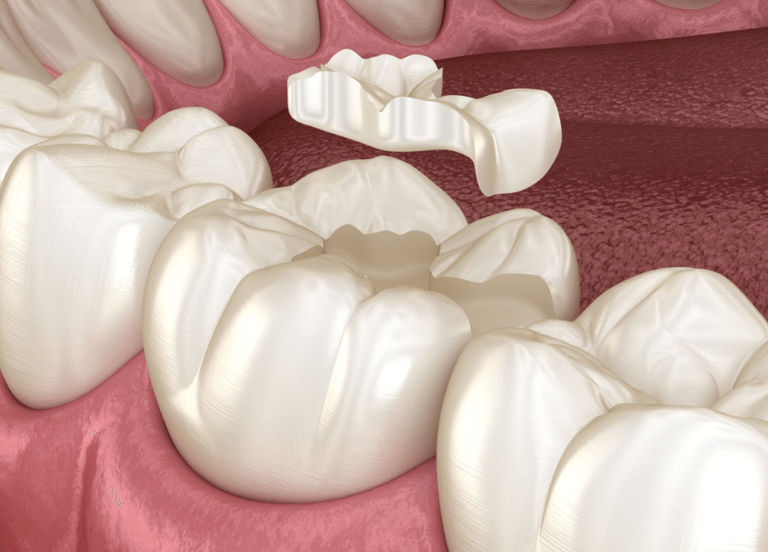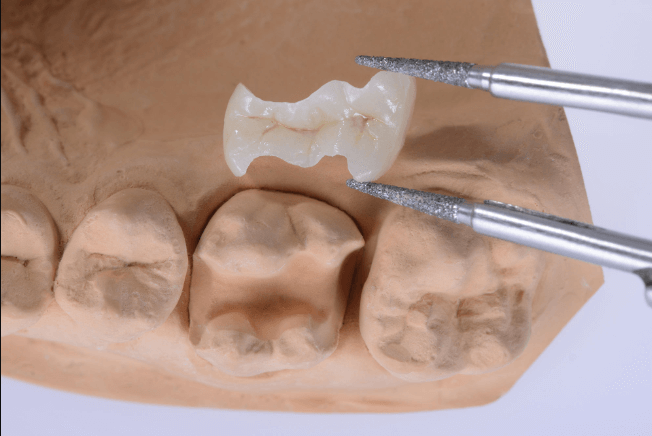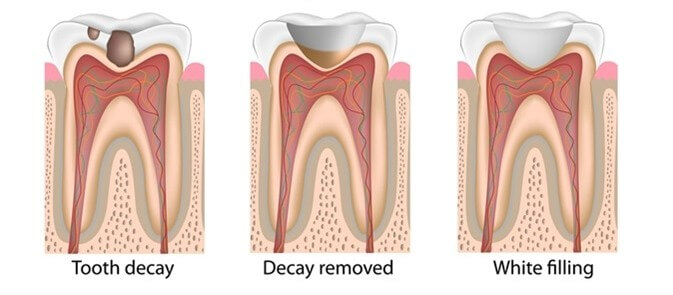Porcelain Inlay

What Is A Porcelain Inlay?
A Porcelain Inlay is a dental restoration crafted from high-quality, biocompatible porcelain, designed to fit precisely within the contours of your tooth. It is custom-made to restore both the functionality and aesthetic of the damaged tooth, providing a seamless integration with your natural teeth. Porcelain inlays are ideal for repairing cavities, fractures, or other dental issues and offer an excellent balance of strength and appearance. Whether you’re looking to replace a filling or repair a fractured tooth, porcelain inlays are a popular choice due to their durability and natural look.
Before deciding on whether a Porcelain Inlay are right for you, there are some things you should know:
- Who Needs A Porcelain Inlay?
- Benefits Of A Porcelain Inlay
- Alternative Treatments To A Porcelain Inlay
- How Much Does A Porcelain Inlay Cost?
- Steps In The Porcelain Inlay Procedure
- Frequently Asked Questions About Porcelain Inlays
If you have any further questions about A Porcelain Inlay or other dental services offered at Atlas Dental, please contact us.

Free phone consultation
Have questions about tooth fillings? Schedule a free phone consultation with our Toronto dentist.

5 star google reviews
Our patients love us! See for yourself why more and more people are choosing Atlas Dental for their dental fillings.

Book Emergency tooth filling
Do you think you have cavities and need an appointment? Book an emergency tooth filling online.
Who Needs A Porcelain Inlay?
Porcelain inlays are a great option for individuals facing various dental issues:
- Moderate Decay: If a cavity extends beyond what a regular filling can handle but is not severe enough for a crown, a porcelain inlay restores both function and appearance.
- Fractured Teeth: Minor cracks or fractures can be strengthened with an inlay, preventing further damage.
- Replacing Large Fillings: When large fillings deteriorate, porcelain inlays offer a more durable and aesthetic solution than amalgam fillings.
- Cosmetic Concerns: For those seeking a more natural appearance, porcelain inlays mimic the color and texture of natural teeth, making them nearly indistinguishable.
- Biocompatibility: Since porcelain is biocompatible, it’s an excellent option for people with sensitivities to metals.
Your dentist will conduct a thorough examination and consider factors such as the extent of damage, the location of the affected tooth, and your overall oral health before recommending a porcelain inlay as the appropriate treatment option. If you have further questions about Porcelain Inlays, please contact us.
Benefits Of A Porcelain Inlay
Porcelain inlays offer several key benefits:
- Natural Appearance: Porcelain mimics the color and translucency of natural teeth, blending seamlessly for a beautiful, undetectable restoration.
- Durability: Porcelain is a strong material that can withstand the forces of chewing and biting, offering a long-lasting restoration.
- Conservative Approach: Unlike crowns, inlays only require the removal of the damaged portion of the tooth, preserving healthy enamel.
- Custom Fit: Porcelain inlays are tailored to each individual tooth, ensuring a snug fit that’s both comfortable and functional.
- Stain Resistance: Porcelain resists staining, maintaining its bright, natural appearance over time.
- Holistic and Biocompatible: Porcelain inlays offer a metal-free, biologically-safe dental solution that promotes overall oral health and eliminates risk of metal allergies or sensitivities.
A porcelain inlay combines both functional and aesthetic advantages, making it an attractive option for individuals seeking a reliable and visually appealing dental restoration. If you have further questions about Porcelain Inlays, please contact us.

Alternative Treatments To A Porcelain Inlay
If porcelain inlays aren’t the right option for you, several alternatives may be considered:
- Composite Fillings: Tooth-colored fillings made from resin that are ideal for smaller cavities.
- Glass Ionomer Fillings: Suitable for less demanding cavities, these fillings release fluoride, helping protect the tooth from decay.
- Amalgam Fillings: Silver fillings, though durable, are more noticeable and less aesthetically pleasing.
- Porcelain Onlays: Similar to inlays, onlays cover larger portions of the tooth, especially the chewing surfaces.
- Dental Crowns: Used when damage is more extensive, crowns cover the entire tooth but may require more tooth reduction.
- Veneers: Thin porcelain layers applied to the front surface of the tooth to enhance its appearance, often used for cosmetic issues.
Factors such as the size and location of the restoration, your oral health, and your aesthetic preferences will all play a role in determining which option is best for your unique situation. If you have further questions about Porcelain Inlays, please contact us.
Cost of Dental Inlays
The cost of a dental inlay can range between $724-1039. The codes relevant to dental inlays in the Ontario Dental Association’s Suggested Fee Guide appear as follows:
Inlays, Porecelain/Ceramic/Polymer Glass (Bonded)
- 25141 – One surface: $524 + Dental Lab Fee ($200)
- 25142 – Two surface: $735+ Dental Lab Fee ($200)
- 25143 – Three surface: $839 + Dental Lab Fee ($200)
Dental Inlays are considered a major restorative service under all dental insurance plans and may or may not be covered by your dental insurance. Be sure to find out from your dental insurance plan provider how much you are eligible for before going ahead with dental treatment. Your dentist can help you submit a predetermination to your dental insurance.
For patients without dental insurance, Atlas Dental is pleased to offer dental financing through iFinance Dentalcard. Affordable payment plans start at 7.95% for terms of 6 months to 6 years. To learn more about Dentalcard dental treatment financing, follow this link.
Steps In The Porcelain Inlay Procedure
The process of getting a porcelain inlay typically involves two appointments:
- Initial Consultation & Tooth Preparation: The dentist evaluates the tooth and removes any decay. After reshaping the tooth, they take an impression to create a custom inlay.
- Fabrication & Temporary Filling: The impression is sent to a dental lab, and a temporary filling is placed to protect the tooth until the permanent inlay is ready.
- Fitting and Bonding: At the second appointment, the inlay is bonded to the tooth, and any necessary adjustments are made to ensure a comfortable fit and proper bite.
By following these steps, the porcelain inlay procedure offers patients a reliable and aesthetically pleasing restoration that enhances the beauty and longevity of their smile. If you have further questions about Porcelain Inlays, please contact us.

Frequently Asked Questions About Porcelain Inlays
- How long do porcelain inlays last?
Porcelain inlays are durable and can last 10 to 15 years with proper care. Regular brushing, flossing, and dental visits will help extend their lifespan.
- Are porcelain inlays better than regular fillings?
Yes, porcelain inlays are stronger and more durable than traditional fillings, especially for larger cavities or areas that experience significant chewing pressure.
- Is the porcelain inlay procedure painful?
The procedure is generally not painful as local anesthesia is used during the treatment. You may experience mild discomfort after the procedure, which can usually be managed with over-the-counter pain relief.
- Can porcelain inlays stain?
Porcelain is highly stain-resistant, so you can enjoy coffee, tea, and other foods without worrying about discoloration.
If you’re considering a porcelain inlay for your tooth restoration needs, don’t hesitate to contact us for a consultation. Our team will help you explore your options, answer any questions, and ensure your smile is restored with precision and care.

